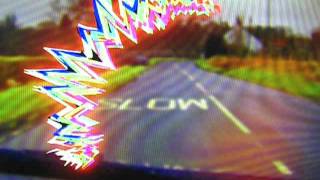Sarah Knows Eyes
.jpg)
Eat Healthily
In general when it comes to “healthy living” I’m a firm believer of ‘everything in moderation’, particularly when it comes to food (and drink!). Try to maintain a healthy, balanced diet, that includes lots of leafy green vegetables, omega-3 (typically found in oily fish) and antioxidant vitamins like A and C, as a deficiency in these has been linked to an increased risk of both cataract and Age-Related Macular Degeneration (AMD).
Stop Smoking
If you smoke, STOP. Smoking significantly increases the risk of developing cataract and AMD. However long you have smoked, it’s never too late to benefit from quitting and reducing your risk.
Get Enough Sleep
As discussed in yesterday’s “Ignoring Important Signs” post, just as with the rest of the body, tiredness and stress can wreak havoc on our eyes. Everybody’s different, and while some people claim to be able to function on as little as four hours sleep (I’m definitely not one of them!), the general recommendation is to aim for 7-9 hours per night.
Avoid Dry Eyes
With reduced tears eyes become dry and sore. Central heating, air conditioning and computer use, can make it worse. Around 15% of adults over the age of 40 suffer; twice as many women as men. Lubricating eye drops can soothe irritation and reduce discomfort.
Consider Nutritional Supplements
Particularly if you have a family history of AMD. Some are specifically designed for eye health and can found in Opticians, Pharmacies and health shops. Flaxseed and evening primrose oil may also help dry eye sufferers.
So, that was #NationalEyeHealthWeek 2015! Over the past 7 days I have enlightened you with what I think, are the 7 Eye "Sins". I hope you have found them interesting and informative? If you'd like further information on any of the issues discussed, or if you think there's anything I've missed, please don't hesitate to contact me - it would be great to get some feedback!
Take care of those peepers people!
Write comment (0 Comments)

An example of an optical migraine
Just as with the rest of the body, tiredness and stress can wreak havoc on our eyes. Symptoms such as headaches, eye strain, floaters, optical migraines, these can all be worrying when we experience them, but are generally not of serious concern, particularly if you know you’ve been under a bit pressure recently? "Floaters" for example (little black/grey spots) in your vision can be quite normal, check out this amazing little video for a better explanation.
However, some visual symptoms canin rare cases indicate a problem which needs treating. As a general rule of thumb, if you’ve had a sudden onset of any unusual visual symptoms, then it would be advisable to get it checked out, just to be on the safe side.
In practice, alarm bells start ringing whenever anyone has/is experiencing flashing lights. The advice here would be to contact your Optician, GP, or the eye emergency department of your local hospital ASAP. Other symptoms to be mindful of include the sudden appearance of a lot of floaters (some people describe it like a "swarm of flies"), recurrent subconjunctival haemorrhage (bloodshot eye), blurred vision, doubling (double vision), eye pain, or as if there is a "net curtain" or "cobweb" in your vision, to name but a few – this is not an exhaustive list. Basically, if you’ve noticed anything unusual, either visually or externally (lumps and bumps), contact your Optician for further advice. Like a lot of these things, most eye problems, if detected early, won’t cause unnecessary loss of vision. So get it checked out as soon as possible. My motto is that it’s always best to air on the side of caution when it comes to your vision – you only get one pair of eyes!
Another thing that you shouldn’t ignore is your family history. Many eye conditions run in families, from simple long and short sightedness, to more serious diseases like glaucoma. Knowledge of “problems” with sight can help detect a condition before it becomes serious. (Also, if you’re 40 or over and have a family history of glaucoma, you won’t have to pay for your sight tests!) It‘s worth asking the question…
If you're concerned, or would like further information on anything discussed in this post, please don’t hesitate to contact me – just click “Ask Sarah” and ask away!
Write comment (0 Comments)

I love being a Dispensing Optician, and always strive to do my job to the best of my ability. Advising the patient as to the correct frame for them (both practically and aesthetically), ensuring that they have been recommended the lens best suited to their individual requirements, and lastly making sure that the finished product is fitting both correctly and comfortably. Once the patient steps outside the door however, it’s pretty much up to them, I’ve done all I can at that point.
The biggest “sin” with regards to spectacle wearing habits, is unsurprisingly NOT wearing them! This isn’t such an issue with somebody that requires their spectacles all of the time, but those that only need to wear them for specific tasks, or those that have been advised to wear them for the first time, can be trying. I have lost count of the number of times I’ve heard: “I don’t really need them”; “they’re not comfortable”; “I don’t like wearing them” or “I forget to put them on”.
If you’re guilty of this, ask yourself… why?
A scrupulous practice will not prescribe spectacles for the fun of it. If we have recommended them to you, it’s because the Optometrist has gauged that they are required as a result of the examination he/she has carried out and from the responses you gave during it. If you’re unsure as to when you’re supposed to wear them or what for – go back and ask the Dispensing Optician to clarify it for you. If they’re not comfortable, again, go back and ask the Dispensing Optician to check the fitting – you’d be surprised, the smallest adjustment can make a big difference! If you don’t like the spectacles you have chosen, or really just don’t like wearing them – the advice is? Strangely enough, go back! Speak to the Dispensing Optician. Would it be possible to choose a different frame? Perhaps Contact Lenses might be an option for you? And if you forget them on a regular basis? Maybe a multifocal lens might be a better choice so that you can wear them all the time. Or getting a couple of pairs, so that you can leave one at home, one at work, one in the car, etc?
You’ll see a pattern emerging here? If you’re not happy with your spectacles, don’t just grin and bear it – GO BACK!! Speak to the nice kind Dispensing Optician! We’re not ogres, we don’t bite. At the end of the day we just want you to be happy with your chosen spectacles, visually and aesthetically.
Another #badhabit is wearing poorly fitting or grubby spectacles. There’s no harm in popping in to see your Dispensing Optician every few months for them to give your spectacles a once-over. Ask them for an MOT on your specs – they’ll know what you mean ;) We can change the nosepads and/or endtips where appropriate if they’ve gotten discoloured, and check that they’re still fitting okay. Spectacles can easily get knocked out of shape, and loosen-up naturally over time.
A final #badhabit, a personal bugbear of mine, is people wearing somebody else’s spectacles! You wouldn’t wear somebody else’s false teeth would you? So why would you wear their spectacles?! Nough said! Grrrrr!
Write comment (0 Comments)

There are Health & Safety laws to ensure that you are safe and protected when doing your job. All safety specs and goggles must comply with British and European Standards, and there are different types of protection depending on the job you do. Health & Safety at Work Regulations require your employer to identify and evaluate workplace risk.
If you work outdoors you may need to protect your eyes from hazards like grit and dust as well as from regular exposure to UV light. Whether you are a gardener, traffic warden, police or road worker, specialist lens options, such as photochromic lenses, can help working outdoors more comfortable. And you can work wearing photochromic lenses without changing spectacles – a big benefit?!
But we’re not just talking about protecting your eyes at work – did you know there are more accidents in the home than at work? DIY can be quite hazardous to the eyes – flying particles or dust, whether you are drilling, using a hammer or chisel; and chemical compounds, everything from ammonia to acids, even super glue can harm your eyes.
Safety spectacles have side shields attached to the side of the frames to avoid any foreign objects entering the eye and surrounding area and it is likely that the lenses supplied will be plastic (thickened CR39), toughened glass (thermally or chemically), low energy impact materials, or materials such as Polycarbonate or Trivex. Safety eyewear can be prescription or non-prescription and come in a variety of different options including spectacles, goggles and shields.
It’s also important to consider protecting your eyes if you work in an office environment. If you spend all day using a computer you may benefit from spectacles that are specifically set to focus of your screen. You also need to consider whether you get glare from lights or window reflections on your screen, putting additional strain on your eyes? If so, you man want to consider an anti-reflective coating on your lenses. Working at a computer, it is important to take regular “visual” breaks. Prolonged use can lead to staring and potentially dry eyes as a result of insufficient blinking. A good way of ensuring you do this is to remember the 20:20:20 rule – every 20 minutes, look away from your screen to a distance of approximately 20 feet for 20 seconds – simple!
If you’re concerned that you’re not protecting your eyes sufficiently – call in and speak to a registered dispensing optician for advice.
Write comment (0 Comments)Page 12 of 16

